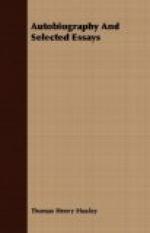I desire to speak with the utmost respect of that science—philology—of which grammar is a part and parcel; yet everybody knows that grammar, as it is usually learned at school, affords no scientific training. It is taught just as you would teach the rules of chess or draughts. On the other hand, if I am to understand by a literary education the study of the literatures of either ancient or modern nations—but especially those of antiquity, and especially that of ancient Greece; if this literature is studied, not merely from the point of view of philological science, and its practical application to the interpretation of texts, but as an exemplification of and commentary upon the principles of art; if you look upon the literature of a people as a chapter in the development of the human mind, if you work out this in a broad spirit, and with such collateral references to morals and politics, and physical geography, and the like as are needful to make you comprehend what the meaning of ancient literature and civilisation is,—then, assuredly, it affords a splendid and noble education. But I still think it is susceptible of improvement, and that no man will ever comprehend the real secret of the difference between the ancient world and our present time, unless he has learned to see the difference which the late development of physical science has made between the thought of this day and the thought of that, and he will never see that difference, unless he has some practical insight into some branches of physical science; and you must remember that a literary education such as that which I have just referred to, is out of the reach of those whose school life is cut short at sixteen or seventeen.




